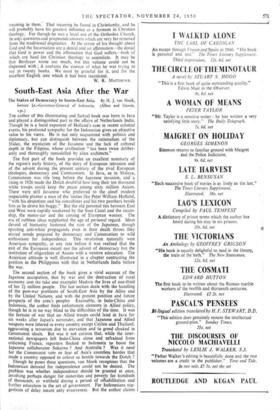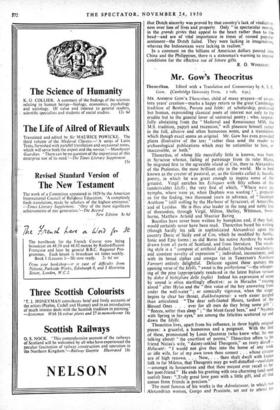South-East Asia After the War
THE author of this illuminating and factual book was born in Java and played a distinguished part in the affairs of Netherlands India. Though he is a lucid exponent of Holland's case in recent colonial events, his profound sympathy for the Indonesian gives an objective value to his views. He is not only acquainted with politics and diplomacy, but can distinguish between the rationalism of the Malay, the mysticism of the Javanese and the lack of cultural depth in the Filipino, whose civilisation "has been twice deliber- ately and thoroughly remodelled by alien architects."
The first part of the book provides an excellent summary of the region's early history, of the story of European intrusion and of the adverit during the present century of the rival European ideologies, democracy and Communism. In Java, as in Malaya, Communism was rife long before the Japanese invasion, and a rising in 1926 made the Dutch doubtful how long their ten thousand white troops could keep the peace among sixty million Asians. There were still Javanese who preferred to the aloof modern respectable planter a man of the 'sixties like Peter William Hofland, "with his despotism and his concubines and his two panthers beside him as he drove his buggy." But the old personal ties between East and West were rapidly weakened by the Suez Canal and the steam- 'ship, the motor-car and the coming of European women. The era of ruthless ideas supplanted the age of personal regard. Ideas devoid of humanity hastened the ruin of the Japanese, though spouting anti-white propaganda even in their death throes they stirred minds prepared by democracy and Communism to wild enthusiasm for independence. This revolution naturally won American sympathy, at any rate before it was realised that the exit of the European meant not the advent of democracy but the institution of oligarchies of Asians with a western education. The American attitude is well illustrated in a chapter contrasting the position in the Philippines with that in Netherlands India before the war.
The second section of the book gives a vivid account of the Japanese occupation, that by war and the destruction of rural economy cost (to take one example) Madura the lives of one-third of her 2f million people. The last section deals with the handling of the post-war problems of South-East Asia by the Allies and by the United Nations, and with the present position and future prospects of the area's peoples. Excusably, -in Indo-China and Indonesia, the author finds unfortunate elements in Allied policy, though he is in no way blind to the difficulties of the time. It was the fortune of war that no Allied troops could land in Java for six weeks after Japan's surrender, and that Japanese and Allied weapons were littered in every country except Ceylon and Thailand, aggravating a terrorism due to starvation and to greed cloaked in Communist ideals. But was it not curious that, while the inter- national newspapers left Indo-China alone and refrained from criticising France, reporters flocked to Indonesia to boost the Japanese collaborator Sukarno ? And Australia ? Was it need for the Communist vote or fear of Asia's countless hordes that made a country opposed to colour so hostile towards the Dutch ? Though he poses these questions. van Mook recognises that the Indonesian demand for independence could not be denied. The problem was whether independence should be granted at once, involving perhaps danger for minorities and poveLty for hundreds of thousands, or withheld during a period of ralabilitation and further education in the art of government. For Indonesians sug- gestions of delay meant only evasiveness. But the author claims that Dutch sincerity was proved by that country's lack of vindictive. ness over loss- of lives and property. Only "in spectacular moves, in the grands gestes that appeal to the heart rather than to the head—and are of vital importance in times of roused popular sentiment—the Dutch failed. They were lacking in imagination, whereas the Indonesians were lacking in realism."
In a comment on the billions of American dollars poured into China and the Philippines, there is a statesman's warning to impose conditions for the effective use of future gifts. R. O. WINSTEDT.















































































 Previous page
Previous page